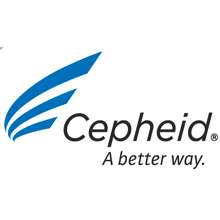Cepheid Inc
 | |
| Public | |
| Traded as | NASDAQ: CPHD |
| Industry | Scientific & Technical Instrument |
| Founded | 1996 |
| Headquarters | Sunnyvale, California |
Key people |
|
| Revenue | $401.29 million (As of 2013)[1] |
| Website | http://www.cepheid.com |
Cepheid Inc (NASDAQ: CPHD) is an American molecular diagnostics company that develops, manufactures and markets fully integrated systems for testing in the clinical market, and for application in its original non-clinical market. The company’s systems enable rapid, sophisticated molecular testing for organisms and genetic-based diseases by automating otherwise complex manual laboratory procedures.[2] It was the winner of 2006 Industrial Design Excellence Awards for its product, Reagent Bead Dispenser.[3] It won the federal contract by "MRSA Reagent Test Kits" in 2012.[4] One of the company's customer is U.S. Food and Drug Administration (FDA).[5]
Founding and incorporation
Cepheid was founded in March 1996 by Thomas Gutshall, Bill McMillan, Dr. Kurt Petersen, Dr. Greg Kovacs, Steven Young and Dr. Allen Northrup. The initial public offering was June 21, 2000 at $6 per share. Cepheid stock is traded on the Nasdaq Global Market System under the ticker symbol CPHD. [6]
The company's first CEO was Tom Gutshall, who held the position from 1996 to 2002.[7] In April 2002, John Bishop was appointed CEO.[8]
Background
The company was thrust into the limelight after the 2001 anthrax attacks as one of the few companies producing rapid, accurate biodetection field units based on DNA analysis. Cepheid had developed unique improvements on Lawrence Livermore National Laboratory's fast-cycling technique for preparing DNA samples. Federal agencies used Cepheid machines to detect the spreading anthrax contamination and identify its possible sources.[9]
The company put a temporary hold on some healthcare development to work with leading defense contractor, Northrop Grumman, on a government contract to install anthrax detection systems at post office sites nationwide. [10]
As of March 31, 2014, Cepheid markets 14 U.S. Food and Drug Administration (FDA) cleared Clinical IVD Tests in the U.S. and 16 CE/IVD tests internationally and has placed 6,012 GeneXpert Systems globally.[11]
On Dec. 6, 2013, Trade-idear LLC identified the company as a new lifetime high candidate for its stock performance.[12]
The company currently offers clinical tests in the areas of healthcare-associated infections, critical infectious diseases, sexual health, and oncology/genetics. As of March 2014, the company has a market capitalization of $ 3.14 billion and an Enterprise value of $2.91 billion.[1]
Systems
SmartCycler System
Cepheid's first testing platform, the SmartCycler System, used technology licensed from Lawrence Livermore National Laboratory to integrate amplification and detection. The instrument was commercially launched in 2000 and yielded the first commercial version of a portable, real-time, nucleic acid detection system. The instrument has up to 96 independently programmable reaction sites, and experimental runs can be started at different times so several operators may use the system concurrently.
GeneXpert System
The GeneXpert System is the only system to combine on-board sample preparation with real-time PCR (polymerase chain reaction) amplification and detection functions for fully integrated and automated nucleic acid analysis. To minimize contamination risks, it is a closed, self-contained platform.
The first clinical application for the GeneXpert System was introduced in 2006 with the US FDA clearance of XpertGBS, a rapid molecular diagnostic test for Group B Streptococcus in expectant women.[13] That same year, XpertGBS was categorized by the FDA as "Moderate Complexity"[14] under the Clinical Laboratory Improvement Amendments (CLIA).[4] It was the first amplified molecular diagnostic test using real-time polymerase chain reaction (PCR) to receive this categorization.[15] This allowed the test to be performed by the over 27,000 institutions registered for CLIA Moderate Complexity in addition to the approximately 7,000 institutions registered for High Complexity tests.
Clinical IVD tests
Healthcare associated infections
- Xpert Carba-R
- Xpert MRSA
- Xpert SA Nasal Complete
- Xpert MRSA/SA SSTI
- Xpert MRSA/SA BC
- Xpert C. difficile
- Xpert C. difficile/Epi
- Xpert vanA
- Xpert Norovirus
Critical infectious diseases
- Xpert MTB/RIF
- Xpert Flu
- Xpert Flu/RSV XC
- Xpert EV
Sexual health
- Xpert CT/NG
- Xpert GBS
- Xpert GBS LB
- Xpert TV
Oncology/genetics
- Xpert FII & FV
References
- Notes
- 1 2 "CPHD Key Statistics | Cepheid, Inc Stock - Yahoo! Finance". Finance.yahoo.com. Retrieved 2014-03-09.
- ↑ "CPHD: Profile: Cepheid - Reuters". http://www.reuters.com/. Retrieved 2014-05-29. External link in
|publisher=(help) - ↑ "2006 Industrial Design Excellence Awards". Markets.financialcontent.com. 2006-07-05. Retrieved 2014-03-09.
- ↑ "Contract Award: Cepheid Wins Federal Contract for "MRSA Reagent". Highbeam.com. 2012-04-16. Retrieved 2014-03-09.
- ↑ "Cepheid (CPHD.O) Company Profile Reuters.com". Reuters.com. Retrieved 2014-03-09.
- ↑ http://ir.cepheid.com/faq.cfm
- ↑ http://www.reuters.com/finance/stocks/officerProfile?symbol=CPHD.O&officerId=151123
- ↑ http://www.reuters.com/finance/stocks/officerProfile?symbol=CPHD.O&officerId=237584
- ↑ http://www.sfgate.com/business/article/Biotech-firms-turn-to-antiterrorism-efforts-2664855.php
- ↑ http://www.sfgate.com/cgi-bin/article.cgi?f=/c/a/2003/03/09/BU210004.DTL&ao=all
- ↑ http://files.shareholder.com/downloads/CPHD/3018278258x0x745135/34E9C3DF-9F27-4675-9829-293288C929D3/CPHD_Q114_Fact_Sheet.pdf
- ↑ "New Lifetime High Today: Cepheid (CPHD)". 2013-12-06. Retrieved 2014-03-09.
- ↑ http://laboratory-manager.advanceweb.com/Article/Cepheids-Xpert-GBSTM-Test-Receives-510k-Clearance-From-FDA.aspx
- ↑ http://wwwn.cdc.gov/clia/Resources/TestComplexities.aspx
- ↑ http://www.thefreelibrary.com/Cepheid+Xpert+GBS%28TM%29+Test+Categorized+as+%27Moderate+Complexity%27.-a0149824793